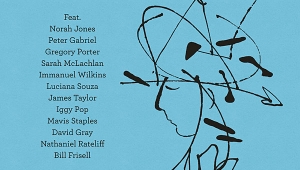| Columns Retired Columns & Blogs |
Recording of January 1995: Gilbert & Sullivan: H.M.S. Pinafore
GILBERT & SULLIVAN: H.M.S. Pinafore
Richard Suart, The Rt. Hon. Sir Joseph Porter, K.C.B.; Thomas Allen, Captain Corcoran; Michael Schade, Ralph Rackstraw; Rebecca Evans, Josephine; Felicity Palmer, Little Buttercup; Donald Adams, Dick Deadeye; Richard Van Allan, Bill Bobstay; Welsh National Opera Orchestra & Chorus, Sir Charles Mackerras
Telarc CD-80374 (CD only). James Mallinson, prod.; Jack Renner, eng. DDD. TT: 73:42
Richard Suart, The Rt. Hon. Sir Joseph Porter, K.C.B.; Thomas Allen, Captain Corcoran; Michael Schade, Ralph Rackstraw; Rebecca Evans, Josephine; Felicity Palmer, Little Buttercup; Donald Adams, Dick Deadeye; Richard Van Allan, Bill Bobstay; Welsh National Opera Orchestra & Chorus, Sir Charles Mackerras
Telarc CD-80374 (CD only). James Mallinson, prod.; Jack Renner, eng. DDD. TT: 73:42
Though the fourth collaboration of W.S. Gilbert and Arthur Sullivan, H.M.S. Pinafore was the first to be an international hit, and was unquestionably the work that forever established "G&S" as a trademark of quality and delight. This third Mackerras/Telarc G&S operetta is the best yet of a cycle that should prove definitive for years to come.
 In its lampooning of Victorian melodrama, Pinafore is perhaps the silliest of all G&S operettas. It's also the freshest, the most sprightly, the most irrepressibly melodic. (And, as it's the shortest full-length G&S work, Telarc has for the first time in this series been able to include every note—including the overture—on a single CD.)
In its lampooning of Victorian melodrama, Pinafore is perhaps the silliest of all G&S operettas. It's also the freshest, the most sprightly, the most irrepressibly melodic. (And, as it's the shortest full-length G&S work, Telarc has for the first time in this series been able to include every note—including the overture—on a single CD.)
Sir Charles Mackerras has brought unprecedented stylishness to the task: never has this score been infused with such wit, grace, buoyancy, or sheer musicality. Mackerras conducts Sullivan's music with all the attention to dancing detail that he brought to the symphonies of Mozart a few years back (also for Telarc), with arguably greater success: everywhere are nuances of tempo and dynamics, and pointings-up of syncopation, that make even this lifelong G&S fanatic delight in heretofore unsuspected treasures in what Sullivan himself considered disposable pop music. I found it impossible to listen without laughing aloud—not that I tried.
I'd recommend this recording for Mackerras alone, but luckily the singing is almost as good. Like the previous Mackerras/Telarc G&S recordings (The Mikado, The Pirates of Penzance), Pinafore is sung straight, with a minimum of comic affectation. This approach works superbly, as Mackerras and singers let the music and words provide the humor, rather than forcing the issue. The result is irresistibly tuneful music beautifully performed—and funny as hell to boot.
Michael Schade is a wonder as Ralph Rackstraw—by far the most sensitive and diffident sailor ever to join Her Majesty's fleet. Richard Suart continues to lengthen his stride in the G&S comic baritone roles, here singing Sir Joseph Porter with just the right blend of pomp, patter, and palpitations. Thomas Allen (a real baritone!) is likely the finest Captain Corcoran on record, and the seemingly immortal Donald Adams here enters his fifth decade of singing G&S as Dick Deadeye—and sounds almost as good as he ever did.
As in previous Welsh National Opera G&S recordings, the women are weaker. Felicity Palmer's Little Buttercup is the best of them, though she tends toward obsessiveness in dotting her rhythmic i's. Rebecca Evans as Josephine has the same small, not-quite-in-control voice that made her Mabel in Pirates less than that fully operatic role deserved, and Valerie Seymour makes all too great an impression—a poor one—in the tiny role of Sir Joseph's Cousin Hebe: shrill and squally, with poor wandering tone.
All of the singers, however, are excellent actors (not hams, as is all too common in G&S), and the WNO Chorus is ideally energetic. The sound is as good as I've ever heard from Telarc, and that's very good: the illusion of orchestra, chorus, and soloists singing in the WNO's Brangwyn Hall, Swansea, Wales is totally convincing. Whether or not due to Telarc's 20-bit recording and their use of the Apogee UV-22 redithering box, the highs are smooth, the midrange sumptuous, the ambience stunningly detailed.
The best G&S productions, whether on disc or stage, are those that make one feel as clever and witty as W.S. Gilbert himself. By the time this Pinafore had ended, I felt no less than a genius.—Richard Lehnert
- Log in or register to post comments




































